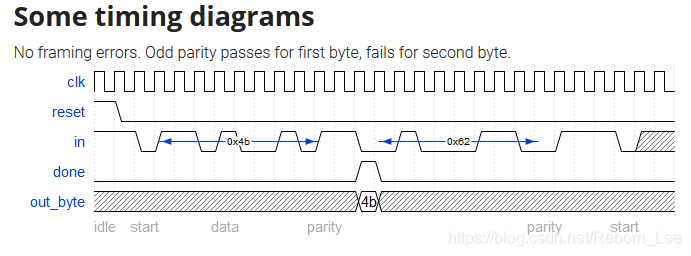HDLBits 系列(39)求解带有奇校验的串口接收数据的简化电路设计
目录
求助原题
先给出原题:(蓝色字体,即是链接本身)
We want to add parity checking to the serial receiver. Parity checking adds one extra bit after each data byte. We will use odd parity, where the number of 1s in the 9 bits received must be odd. For example, 101001011 satisfies odd parity (there are 5 1s), but 001001011 does not.
Change your FSM and datapath to perform odd parity checking. Assert the done signal only if a byte is correctly received and its parity check passes. Like the serial receiver FSM, this FSM needs to identify the start bit, wait for all 9 (data and parity) bits, then verify that the stop bit was correct. If the stop bit does not appear when expected, the FSM must wait until it finds a stop bit before attempting to receive the next byte.
You are provided with the following module that can be used to calculate the parity of the input stream (It's a TFF with reset). The intended use is that it should be given the input bit stream, and reset at appropriate times so it counts the number of 1 bits in each byte.
-
module parity (
-
input clk,
-
input reset,
-
input in,
-
output odd);
-
-
always @(posedge clk)
-
if (reset) odd <= 0;
-
else if (in) odd <= ~odd;
-
-
endmodule
-
-
Note that the serial protocol sends the least significant bit first, and the parity bit after the 8 data bits.

我的方案
如何用状态机设计这个电路呢?
求助路过的同行尝试做下这个题?
如果能Success,希望能告知一下,感谢。
我已经把不带奇偶校验的设计给出,如下:
https://blog.csdn.net/Reborn_Lee/article/details/103438860
https://blog.csdn.net/Reborn_Lee/article/details/103439297
最后给出我的不成功的方案:
状态转移图

我的设计
-
module top_module(
-
input clk,
-
input in,
-
input reset, // Synchronous reset
-
output [7:0] out_byte,
-
output done
-
); //
-
// Use FSM from Fsm_serial
-
localparam START = 0, B1 = 1, B2 = 2, B3 = 3, B4 = 4, B5 = 5, B6 = 6, B7 = 7, B8 = 8, B9 = 9, STOP = 10, D0 = 11, D1 = 12, D2 = 13;
-
reg [3:0] state, next_state;
-
wire odd;
-
wire en;
-
reg [7:0] out_byte_mid;
-
always@(*) begin
-
case(state)
-
START: begin
-
if(~in) next_state = B1;
-
else next_state = START;
-
end
-
B1: begin
-
next_state = B2;
-
end
-
B2: begin
-
next_state = B3;
-
end
-
B3: begin
-
next_state = B4;
-
end
-
B4: begin
-
next_state = B5;
-
end
-
B5: begin
-
next_state = B6;
-
end
-
B6: begin
-
next_state = B7;
-
end
-
B7: begin
-
next_state = B8;
-
end
-
B8: begin
-
next_state = B9;
-
end
-
B9: begin
-
next_state = STOP;
-
end
-
STOP: begin
-
if(in&&odd) next_state = D0;
-
else if(in&&(~odd)) next_state = D2;
-
else next_state = D1;
-
end
-
D0: begin
-
if(in == 1) next_state = START;
-
else next_state = B1;
-
end
-
D1: begin
-
if(in == 0) next_state = D1;
-
else next_state = START;
-
end
-
D2: begin
-
if(in) next_state = D2;
-
else next_state = B1;
-
end
-
default: begin
-
next_state = START;
-
end
-
-
endcase
-
end
-
-
always@(posedge clk) begin
-
if(reset) state <= START;
-
else state <= next_state;
-
end
-
-
always@(*) begin
-
case(state)
-
START: begin
-
;
-
end
-
B1: begin
-
out_byte_mid[0] = in;
-
end
-
B2: begin
-
out_byte_mid[1] = in;
-
end
-
B3: begin
-
out_byte_mid[2] = in;
-
end
-
B4: begin
-
out_byte_mid[3] = in;
-
end
-
B5: begin
-
out_byte_mid[4] = in;
-
end
-
B6: begin
-
out_byte_mid[5] = in;
-
end
-
B7: begin
-
out_byte_mid[6] = in;
-
end
-
B8: begin
-
out_byte_mid[7] = in;
-
end
-
B9: begin
-
;
-
end
-
STOP: begin
-
;
-
end
-
D0: begin
-
;
-
end
-
D1: begin
-
;
-
end
-
D2: begin
-
;
-
end
-
default: begin
-
;
-
end
-
-
endcase
-
end
-
assign done = (state == D0) ? 1 : 0;
-
assign en = (state == B1)||(state == B2)||(state == B3)||(state == B4) ||(state == B5)||(state == B6)||(state == B7)||(state == B8)||(state == B9) ? 1: 0;
-
-
assign out_byte = done ? out_byte_mid : 8'b0;
-
-
// New: Add parity checking.
-
parity inst_parity(
-
.clk(clk),
-
.reset(reset),
-
.in(in&en),
-
//.en(en),
-
.odd(odd)
-
);
-
-
endmodule
等待你的方案?
20200107更新,下面是群里的一位老哥的答案,十分感谢,还没来得及看,先放这里,以免忘记。

-
module top_module(
-
input clk,
-
input in,
-
input reset, // Synchronous reset
-
output [7:0] out_byte,
-
output done
-
);
-
-
reg odd;
-
reg[4:0] state,nstate;
-
parameter start=0,d0=1,d1=2,d2=3,d3=4,d4=5,d5=6,d6=7,d7=8,stop=9,done1=10,done2=11,w=13,p=12;
-
always@(*)
-
begin
-
case(state)
-
start:begin if(in==0)nstate=d0;else nstate=start;end
-
d0:begin nstate=d1;out_byte[0]=in;end
-
d1:begin nstate=d2;out_byte[1]=in;end
-
d2:begin nstate=d3;out_byte[2]=in;end
-
d3:begin nstate=d4;out_byte[3]=in;end
-
d4:begin nstate=d5;out_byte[4]=in;end
-
d5:begin nstate=d6;out_byte[5]=in;end
-
d6:begin nstate=d7;out_byte[6]=in;end
-
d7:begin nstate=p;out_byte[7]=in;end
-
p: begin nstate=stop; odd=^out_byte[7:0]^in; end
-
stop: begin if(in==1) nstate=done1;else nstate=w; end
-
done1:begin if(in==1) nstate=start;else nstate=d0; end
-
w:begin if(in==1) nstate=start;else nstate=w; end
-
endcase
-
end
-
-
always@(posedge clk)
-
begin
-
if(reset==1)
-
state<=start;
-
else
-
state<=nstate;
-
end
-
assign done=(state==done1&&odd)?1:0;
-
endmodule
文章来源: reborn.blog.csdn.net,作者:李锐博恩,版权归原作者所有,如需转载,请联系作者。
原文链接:reborn.blog.csdn.net/article/details/103495485
- 点赞
- 收藏
- 关注作者


评论(0)